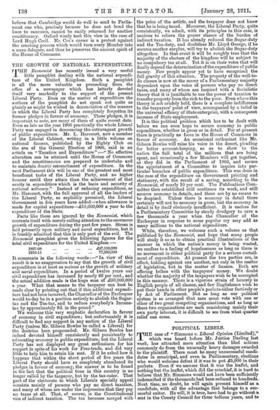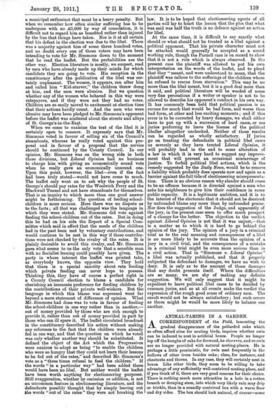POLITICAL LIBELS. T HE case of "Simmons V. LTheral Opinion. (Limited),"
which was heard before Mr. Justice Darling last week, has attracted more attention than libel actions commonly do from the unusually heavy damages awarded to the plaintiff. There must be many unsuccessful candi- dates in municipal, and even in Parliamentary, elections who would welcome defeat if it was to put £5,000 in their pockets. Even if we assume that it was the leaflet, and nothing but the leaflet, which did the mischief, it is hard to believe that Mr. Simmons would not have been sufficiently indemnified if the thousands had been reduced to hundreds. Next time, no doubt, he will again present himself as a candidate, with all the advantage that belongs to a suc- cessful suitor. He will, it is true, have had to go without a seat in the County Council for three tedious years, and to a municipal enthusiast that must be a heavy penalty. But when we remember how often similar suffering has to be undergone with no -25,000 by way of consolation, it is difficult not to regard him as benefited rather than injured by the line that things have taken. Nor is it at all certain that his defeat in the election was due to the libel. There was a majority against him of some three hundred votes, and no doubt every one of these voters may have been intending to vote for Mr. Simmons down to the moment that he read the leaflet. But the probabilities are the other way. Election literature is mostly, we suspect, read by men who have already made up their minds for which candidate they are going to vote. His reception in the constituency after the publication of the libel was cer- tainly unpleasant. The women, it appears, ran after him and called him " Kid-starver," the children threw dung at him, and the men were abusive. But we question whether any of the women who behaved in this way were ratepayers, and if they were not they had no votes. Children are so easily moved to excitement at election time that their actions hardly count. And the men who were abusive may have been pledged to Mr. Simmons's opponent before the leaflet was scattered about the streets and alleys of St. George's-in-the-East. When we come to examine the text of the libel it is certainly open to censure. It expressly says that Mr. Simmons voted in favour of selling six of the Council's steamboats, whereas he really voted against this pro- posal and in favour of a proposal that the service should be continued by the County Council. In our opinion, Mr. Simmons was on the wrong side in both these divisions, but Liberal Opinion had no business to charge him with giving an economically sound vote when he really gave an economically unsound one. Upon this point, however, the libel—even if the fact had been truly stated—would not have come to much. The leaflet only went on to ask why the people of St. George's should pay rates for the Woolwich Ferry and the Blackwall Tunnel and not have steamboats for themselves. That is an inquiry to which more than one good answer might be forthcoming. The question of feeding school- children is more serious. Here there was no dispute as to the facts ; all that was challenged was the language in which they were stated. Mr. Simmons did vote against feeding the school-children out of the rates. But in doing this he had on his side the Report of a Special Com- mittee which said in effect that the needs of the children had in the past been met by voluntary contributions, and would continue to be met in this way if these contribu- tions were not checked by the rivalry of the rates. It is plainly desirable to avoid this rivalry, and. Mr. Simmons gave what seems to us the only vote that a sensible man with no Socialist leaning could possibly have given. The party in whose interest the leaflet was printed take, as everybody knows, the opposite view. They hold that there is a special sanctity about rate feeding which private feeding can never hope to possess. Thinking this, they have of course a perfect right in a County Council election to blame a candidate for cherishing an insensate preference for feeding children by the contributions of their private well-wishers. But the language in which this blame was expressed went far beyond a mere statement of difference of opinion. What Mr. Simmons had done was to vote in favour of feeding the school-children in one way rather than in another,— out of money provided by those who are rich enough to provide it, rather than out of money provided in part by those who can ill spare it. The leaflet circulated broadcast in the constituency described his action without making any reference to the fact that the children were already fed. in one way, and that the question on which he voted was only whether another way should be substituted. It defined the object of the Act which the Progressives were anxious to adopt as being "to enable the children who were so hungry that they could not learn their lessons to be fed out of the rates," and described Mr. Simmons's vote as a "three times refusal to feed the children." If the words "in a particular way" had been added there would have been no libel. But neither would the leaflet have been worth anything for electioneering purposes. Still exaggeration, whether by omission or addition, is not an uncommon feature in electioneering literature, and the defendants possibly thought that by simply leaving out the words "out of the rates" they were not breaking the law. It is to be hoped that electioneering agents of all parties will lay to heart the lesson that the pica that what was said was half the truth is no defence against an action for libel.
At the same time, it is difficult to say exactly what should or what should not be treated as a libel against a political opponent. That his private character must not be attacked, would generally be accepted as a sound working rule, though the Parnell case is on record to show that it is not a rule which is always observed. In tin present case the plaintiff was allowed to put his own interpretation on the words of the leaflet, and to plead that they "meant, and were understood to mean, that the plaintiff was callous to the sufferings of the children whom he refused to rescue from starvation." This may be no more than the libel meant, but it is a good deal more than it said, and political literature will be weeded of some very fine perorations if a writer or speaker is not to be allowed to describe his opponent's conduct in his own way. It has commonly been held that political passion is an excuse for much that would be bad form, and worse than bad form, at other and less exciting moments ; and if this error is to be corrected by heavy damages, we shall either have to put up with a succession of hard cases, or see juries preferring to leave the license of the political libeller altogether unchecked. Neither of these results can be regarded as wholly satisfactory. If juries go on treating the defendants ba political libel cases as severely as they have treated Liberal Opinion, it will probably lead in the end to some alteration of a law in which it is very hard to suggest any improve- ment that will prevent an occasional miscarriage of justice. To forbid political libel actions, which is the remedy suggested by the Daily News, would be to remove a liability which probably does operate now and again as a barrier against the full tide of electioneering misrepresenta- tion. There is no obvious reason why slander should cease to be an offence because it is directed against a man who asks his neighbours to give him their confidence in some public capacity. It is a legitimate ambition, and it is to the interest of the electorate that it should not be deceived by unfounded blame any more than by unfounded praise. Nor does the suggestion of the Judge, and apparently of the jury, in the present case seem to offer much prospect of a change for the better. The objection to the verdict against Liberal Opinion is not that it was unjust,—that is a matter as to which it is hard to go behind the opinion of the jury. The opinion of a jury in a, criminal trial as to the real meaning and consequences of a libel is no more likely to be accurate than the opinion of a jury in a civil trial, and the consequences of a mistake in a criminal trial might be even more serious than in a civil action. That in "Simmons v. Liberal Opinion" a libel was actually published, and that it properly subjected the defendant to damages, we have no wish to deny. It is only as to the amount of those damages that any doubt presents itself. Where the difficulties are so many, we are shy of making any definite suggestion. We will only suggest that it might be expedient to leave political libel cases to be decided by common juries, and so at all events make the verdict the expression of the rough good sense of ordinary men. The result would not be always satisfactory ; but such errors as there might be would be more likely to balance one another.























































 Previous page
Previous page